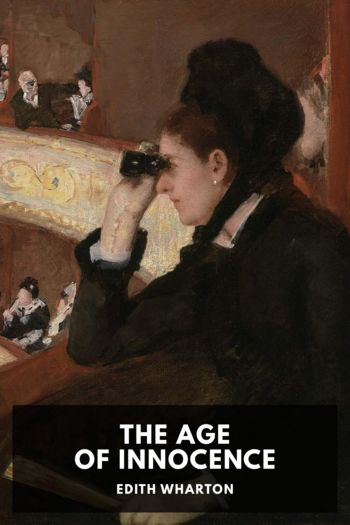The Age of Innocence, Edith Wharton [best 7 inch ereader txt] 📗

- Author: Edith Wharton
Book online «The Age of Innocence, Edith Wharton [best 7 inch ereader txt] 📗». Author Edith Wharton
On the Wednesday morning, when he reached his office, Mr. Letterblair met him with a troubled face. Beaufort, after all, had not managed to “tide over”; but by setting afloat the rumour that he had done so he had reassured his depositors, and heavy payments had poured into the bank till the previous evening, when disturbing reports again began to predominate. In consequence, a run on the bank had begun, and its doors were likely to close before the day was over. The ugliest things were being said of Beaufort’s dastardly manoeuvre, and his failure promised to be one of the most discreditable in the history of Wall Street.
The extent of the calamity left Mr. Letterblair white and incapacitated. “I’ve seen bad things in my time; but nothing as bad as this. Everybody we know will be hit, one way or another. And what will be done about Mrs. Beaufort? What can be done about her? I pity Mrs. Manson Mingott as much as anybody: coming at her age, there’s no knowing what effect this affair may have on her. She always believed in Beaufort—she made a friend of him! And there’s the whole Dallas connection: poor Mrs. Beaufort is related to every one of you. Her only chance would be to leave her husband—yet how can anyone tell her so? Her duty is at his side; and luckily she seems always to have been blind to his private weaknesses.”
There was a knock, and Mr. Letterblair turned his head sharply. “What is it? I can’t be disturbed.”
A clerk brought in a letter for Archer and withdrew. Recognising his wife’s hand, the young man opened the envelope and read: “Won’t you please come up town as early as you can? Granny had a slight stroke last night. In some mysterious way she found out before anyone else this awful news about the bank. Uncle Lovell is away shooting, and the idea of the disgrace has made poor Papa so nervous that he has a temperature and can’t leave his room. Mamma needs you dreadfully, and I do hope you can get away at once and go straight to Granny’s.”
Archer handed the note to his senior partner, and a few minutes later was crawling northward in a crowded horsecar, which he exchanged at Fourteenth Street for one of the high staggering omnibuses of the Fifth Avenue line. It was after twelve o’clock when this laborious vehicle dropped him at old Catherine’s. The sitting-room window on the ground floor, where she usually throned, was tenanted by the inadequate figure of her daughter, Mrs. Welland, who signed a haggard welcome as she caught sight of Archer; and at the door he was met by May. The hall wore the unnatural appearance peculiar to well-kept houses suddenly invaded by illness: wraps and furs lay in heaps on the chairs, a doctor’s bag and overcoat were on the table, and beside them letters and cards had already piled up unheeded.
May looked pale but smiling: Dr. Bencomb, who had just come for the second time, took a more hopeful view, and Mrs. Mingott’s dauntless determination to live and get well was already having an effect on her family. May led Archer into the old lady’s sitting-room, where the sliding doors opening into the bedroom had been drawn shut, and the heavy yellow damask portières dropped over them; and here Mrs. Welland communicated to him in horrified undertones the details of the catastrophe. It appeared that the evening before something dreadful and mysterious had happened. At about eight o’clock, just after Mrs. Mingott had finished the game of solitaire that she always played after dinner, the doorbell had rung, and a lady so thickly veiled that the servants did not immediately recognise her had asked to be received.
The butler, hearing a familiar voice, had thrown open the sitting-room door, announcing: “Mrs. Julius Beaufort”—and had then closed it again on the two ladies. They must have been together, he thought, about an hour. When Mrs. Mingott’s bell rang Mrs. Beaufort had already slipped away unseen, and the old lady, white and vast and terrible, sat alone in her great chair, and signed to the butler to help her into her room. She seemed, at that time, though obviously distressed, in complete control of her body and brain. The mulatto maid put her to bed, brought her a cup of tea as usual, laid everything straight in the room, and went away; but at three in the morning the bell rang again, and the two servants, hastening in at this unwonted summons (for old Catherine usually slept like a baby), had found their mistress sitting up against her pillows with a crooked smile on her face and one little hand hanging limp from its huge arm.
The stroke had clearly been a slight one, for she was able to articulate and to make her wishes known; and soon after the doctor’s first visit she had begun to regain control of her facial muscles. But the alarm had been great; and proportionately great was the indignation when it was gathered from Mrs. Mingott’s fragmentary phrases that Regina Beaufort had come to ask her—incredible effrontery!—to back up her husband, see them through—not to “desert” them, as she called it—in fact to induce the whole family to cover





Comments (0)